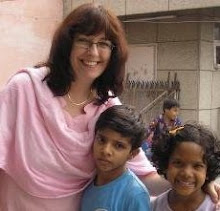
Determined to Learn
 “They tell me I will never get married.” Those are the words uttered by Asmeen when she first met Anita, school teacher at the Bawana tuition center. When Asmeen was five years old she fell on the corner of a bed and her left eye got injured. Her family did not have the means to treat her properly so Asmeen lost her eye.
“They tell me I will never get married.” Those are the words uttered by Asmeen when she first met Anita, school teacher at the Bawana tuition center. When Asmeen was five years old she fell on the corner of a bed and her left eye got injured. Her family did not have the means to treat her properly so Asmeen lost her eye.
Asmeen never got a chance to go to school, and being blind in one eye, her prospects for the future looked bleak. Any kind of handicap is a major hurdle in looking for a bridegroom. That was until Asmeen ran into Anita. Anita is a very devoted HOPE worldwide staff member who takes her job seriously. For Anita, teaching children goes beyond academics.
Anita reached out to Asmeen and invited her to join the tuition center even though Asmeen had never had any formal schooling. At the age of thirteen she knew far less than the younger children at the school.
Asmeen is a very determined young woman though. She comes to the tuition center every day. In her first month she learnt her alphabet, and she started to read and count. The plight of illiterate women in
Who knows what the future now holds? With a determined attitude and the support of the dedicated HOPE staff Asmeen’s life may have taken a significant turn for the better.








